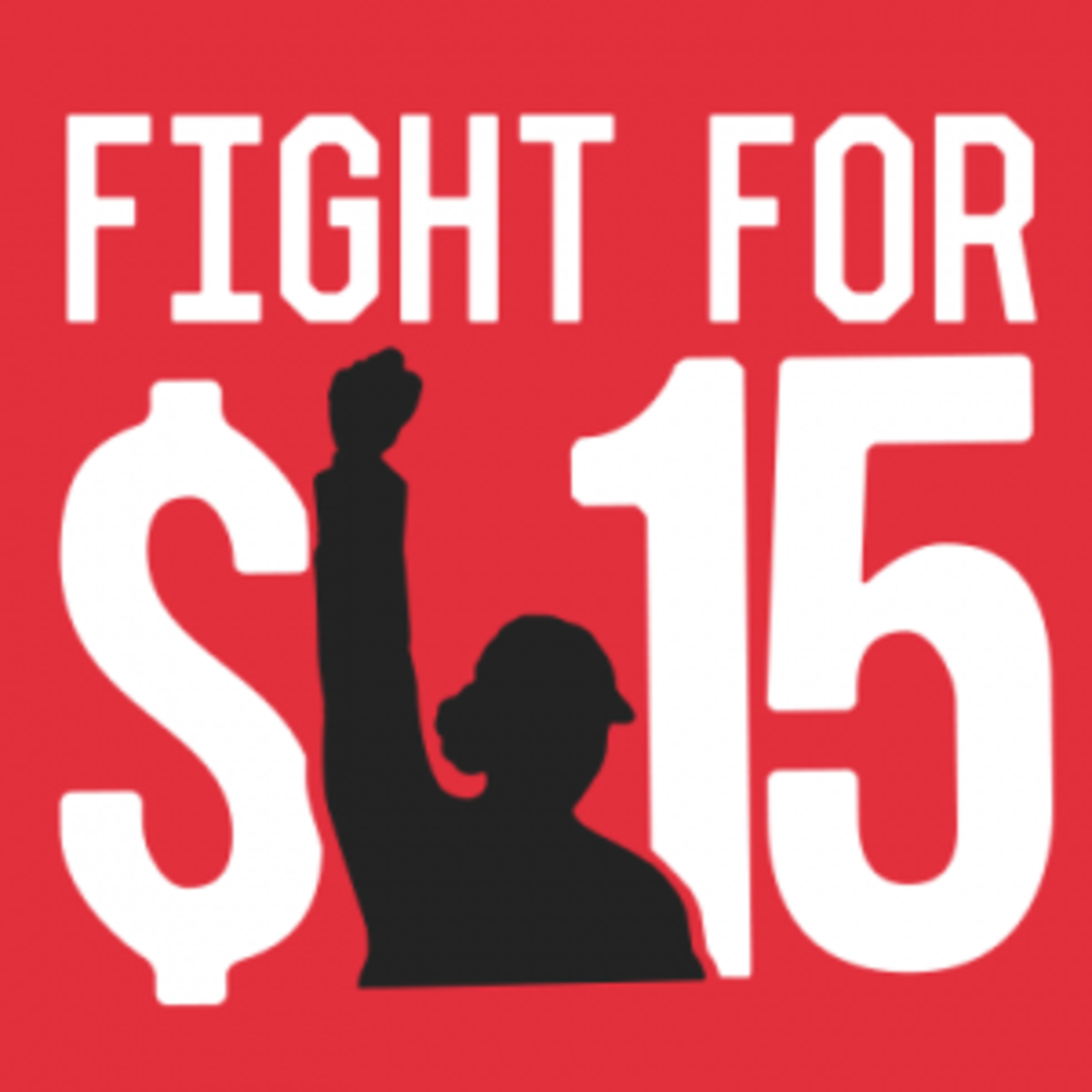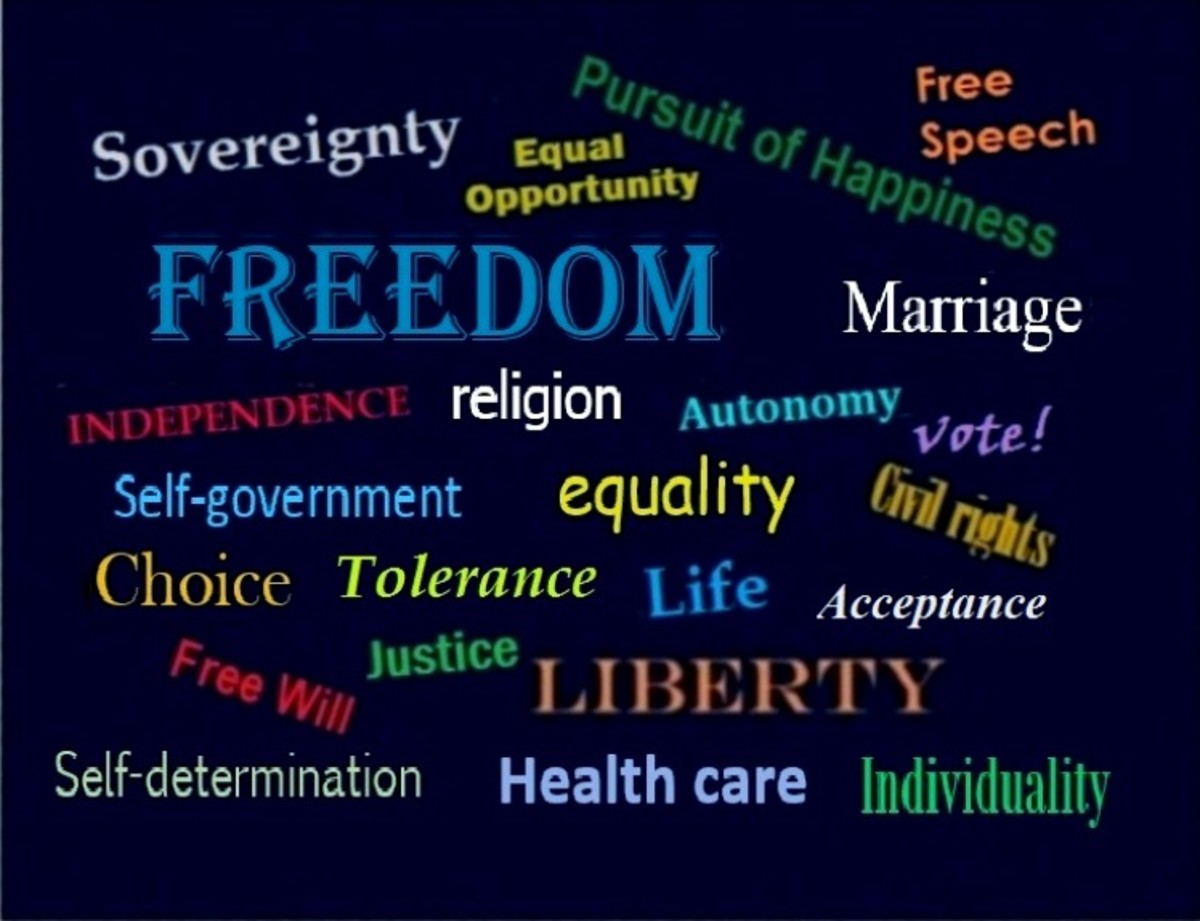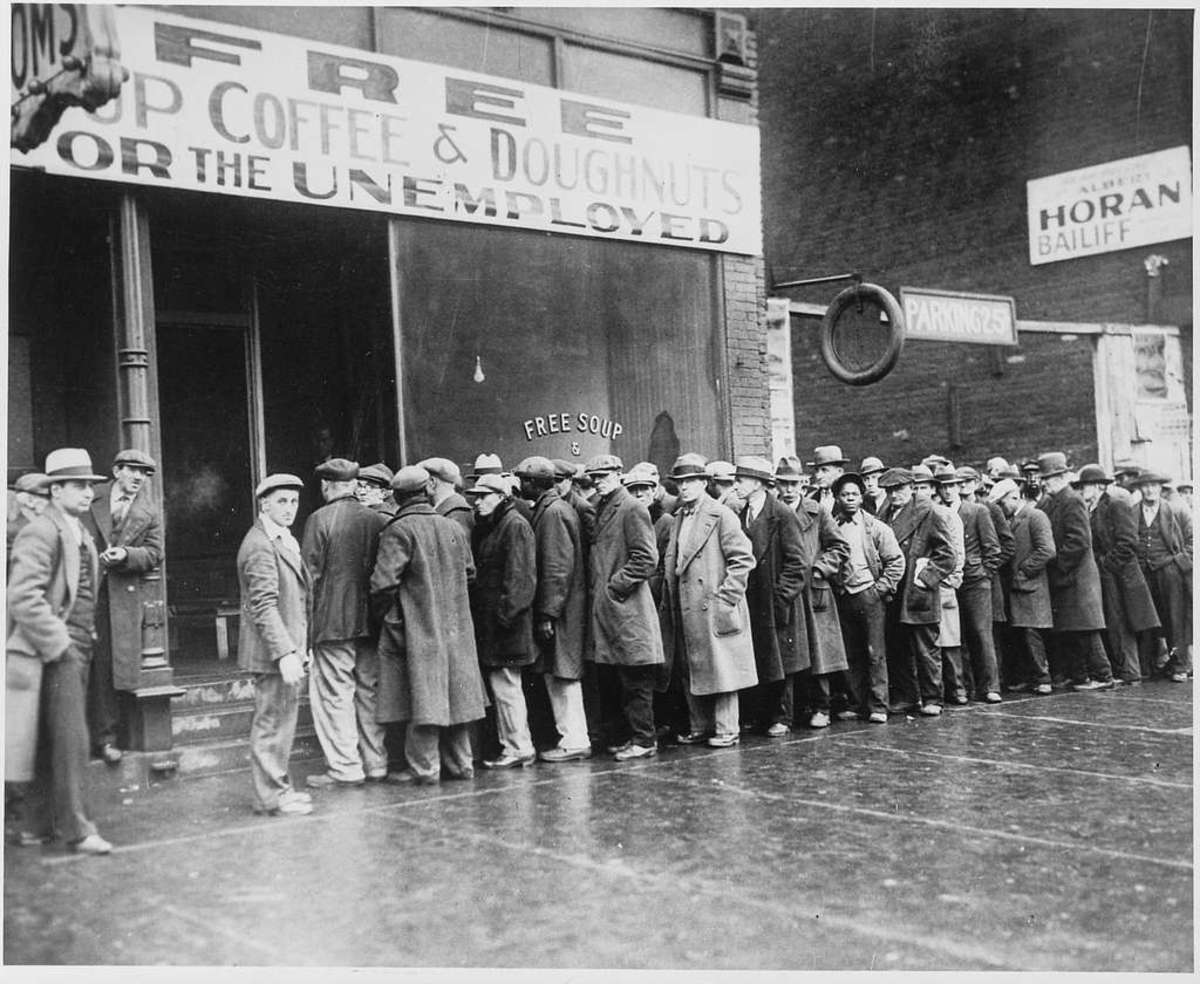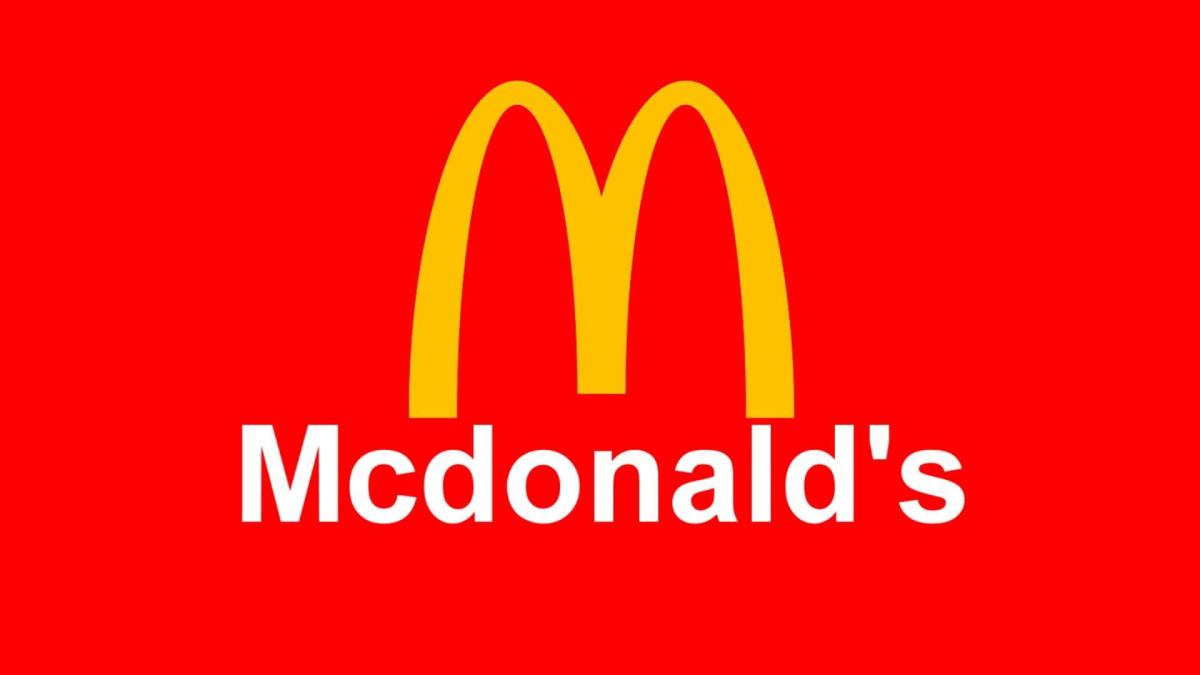Does Minimum Wage Law Hurt the US Economy and Destroy Jobs?
I have been familiarized with minimum wage in multiple states across the country. Through high school, college, and even after college, I have worked in a variety of positions paying me the absolute minimum amount possible.
Although, like most people, I see my time as worth $50-$100/hr as opposed to the $7.50 I have been receiving, as a resident in a struggling community, a student of business, and a global Christian, I have started to ponder the value and effect of minimum wage law on our nation and the world as a whole.
I invite you to read the follow in an attempt to begin the journey of developing a better method of alleviating poverty and strengthening the global economy in an ethical (in my case Christian) manner.

The History of Minimum Wage Law
The first country to pass a minimum wage law was New Zealand in 1894. Needless to say, this was due to the anticipation that New Zealanders had of making a lot of money when the Lord of the Rings trilogy was filmed in their back yards. Today, about 90% of nations have some form of minimum wage in place - though at varying amounts and measures of time (some are hourly, others are monthly).
Minimum wage law was initially passed in the United States in 1938. The primary goal of the law actually appeared to be a Northern attempt to maintain control over the South - as the goal was to put the low-technology, low-wage factories of the South out of business. This encouraged the large migration of workers from Southern towns to Detroit where they could work in the auto manufacturing industry where workers could find relatively high paying jobs.
While minimum wage laws in the US have continued to gradually increase, it has been stated by some economists that, for minimum wage to keep up with inflation, minimum wage would need to be about $11.50 per hour now. In other words, if you are working for the same minimum wage that was in place 80 years ago, you should be receiving several dollars more per hour than you are actually getting.

The Perceived Benefits of Minimum Wage
Clearly, if you have ever worked for minimum wage, you understand the benefits of this law. When I work for $7.50 an hour, I am barely able to pay for the gasoline I need to drive to work and the grocery store. If minimum wage was less, trying to cover the costs of living would be a bigger nightmare.
The traditional belief is that minimum wage helps the little guy. Because big corporations are run by greedy businessmen who only care about making large amounts of money, minimum wage is a noble knight in shining armor that defeats the evil corporate dragon - providing at least a little peace and safety to the helpless. In fact, that's Robin Hoods motto: "Rob the rich to feed the poor"!
We have learned in high school history class about the sweatshops that our ancestors had to work in. These jobs required adults (and sometimes even children) to work 12 hours a day, 6 days a week, for barely enough money to buy food. Meanwhile, those that owned the factories were making ridiculously large amounts of money. This was an embarrassing and shameful time in our history.
Clearly, minimum wage laws are capable of minimizing the effect of unethical behavior by corrupt business professionals.
But is minimum wage actually the best method for alleviating poverty? Does minimum wage protect the marginalized in society?
The True Value of Money
An effective way to look at the value of money is to exchange money for time (after all, we get paid per hour). Let's say that the typical person's time is worth $10/hour. This means that if I hire you for one hour, then I will pay you $10.
Therefore, in a perfect society where everyone is equally strong, equally intelligent, equally creative, and equally productive, everyone earns $10/hour.
1 Hour of Work = $10
This is basic math, so I hope you understand it.
Now let's use this model to determine the cost of making a chair. It takes 1 hour to cut down the tree and bring in the wood, 2 hours to shape the wood into a chair, and 1 hour to find someone who wants to buy the chair. Therefore, how many hours does this chair take to make? 1+2+1=4. This means that, in a perfect society, this chair would sell for $40 (4 hours of work x $10). Then each person would walk away with $10 per hour of work.
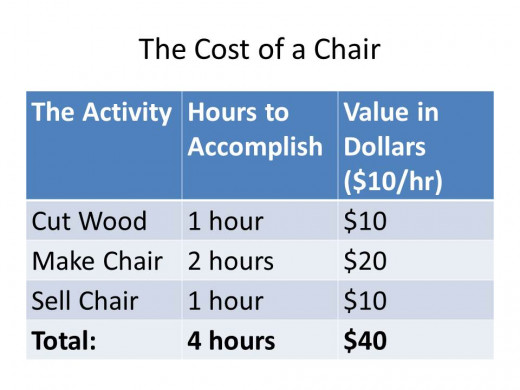
What Happens When Minimum Wage Increases?
When minimum wage goes up, one of two things takes place:
- The cost of products increases to compensate for cost of minimum wage.
- The production of the product is taken to a country where minimum wage is lower.
This makes sense when you look at money as time. After all, the chair will take 4 hours to make regardless of whether the employees are being paid $10 an hour or $20 an hour. Therefore, the owner must either sell the chair for more, outsource the work to somewhere where it is cheaper, or go out of business - none of which actually help the economy.
Let's look at these scenarios a little bit closer.
The Cost of the Chair Increases
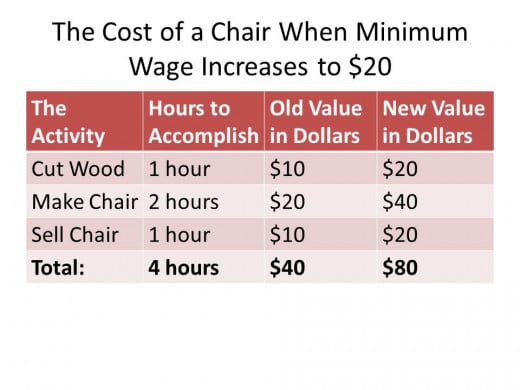
As you can see, the chair now costs $80 to make instead of $40 - even though the amount of time needed to make the chair remains the same.
Let's say that Bob makes the chairs. Bob has needed to buy a new chair for a while, but it costs Bob $40 to purchase a new chair (before the minimum wage increase). Therefore, Bob would have to work 4 hours to earn enough to purchase the chair.
Because Bob wants to buy the chair without working as hard, Bob votes on the bill to higher minimum wage from $10 an hour to $20. He is ecstatic when it passes because now Bob only has to work 2 hours to earn the $40 to purchase the chair. This thrills Bob.
The day after the bill is passed, Bob goes to work only to discover that the chair now costs $80 instead of $40! He is devastated.
And why does the chair cost $80? Because Bob's employer has to pay him $20/hour for the 4 hours of work needed to make the chair - a total of $80.
Of course, Bob is incredibly upset and refuses to buy the chair for $80, so his employer is unable to sell the chair - leading to the next option.
The Building of the Chair is Outsourced
Bob's boss has to sell chairs to survive, and now Bob will not buy the chair because it costs too much. Therefore, Bob's boss has to do something to lower the cost of the chair so that Bob will buy it.
Bob's boss has heard about outsourcing. He discovers that Jack, who lives in the neighboring country, is still willing to build the chair for $10 an hour. Therefore, Bob's boss decides to hire Jack to build the chair for $40 (4 hours of work).
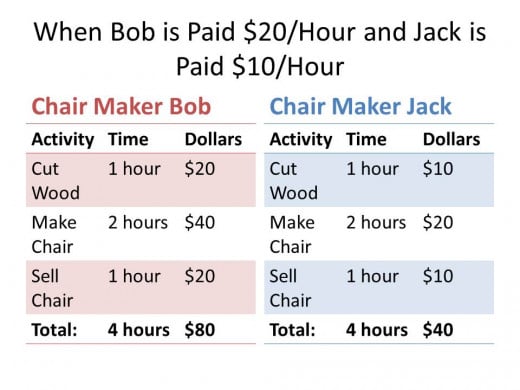
This all happens over the weekend and Bob sees that the cost of the chair is $40 again. Excited, he purchases the chair and goes home to sit in it.
Now, when Bob shows up to work the following Monday, he discovers that he no longer has a job. Why? Because Jack, from the neighboring country, is doing Bob's job.
One of two things can happen to Bob at this point. If he is lucky, he can find another job for $20/hour. If this is the case, he is then able to continue buying chairs for just 2 hours of work (even though it requires 4 hours of work for Jack). However, if Bob has bad luck, he will not be able to find a job and will have to receive unemployment.
The Case Against Minimum Wage
After spending some time thinking and studying about the concept of minimum wage and it's affect on jobs being outsourced, I have concluded minimum wage is not the solution for minimizing poverty.
There are three reasons that I believe minimum wage is worthless as an attempt to help those that are struggling:
- It has no long-term benefit in saving people money: When looking at costs in terms of "hours" instead of "money" we can see that, even when minimum wage increases, the number of hours needed to make a product remain the same. There is a temporary benefit - the time it takes for products to increase in price - but this is short-term and provides a false sense of wealth.
- It causes jobs to be outsourced: The entire reason people want a higher minimum wage is to purchase more. This means that people want things for as cheap as they can purchase them. Therefore, the only way that companies can please customers is through outsourcing the work to another country.
- It reduces jobs for the under-educated and under-experienced: Minimum wage laws don't hurt the CEO's of companies, the well educated, or the politicians. Minimum wage laws hurt people with little experience or little education. After all, the jobs that are outsourced are the jobs that would go to someone who is not capable of complex tasks. Yes, $5/hour is low pay, but is it better than no pay at all? Or worse yet, no job at all (remember, most of us work for a sense of purpose, not only for the paycheck).
"BUT WAIT!" You holler at my loudly. "Won't big corporations taken advantage of not having a minimum wage law?"
My reply: YES.
The Problem Behind Minimum Wage
Now you may be really confused. If I believe that corporations will take advantage of workers if there is no minimum wage law, why do I believe it should be removed?
Well, now that you understand that money is simply a holder of time ($10=1 hour of work), this should be an easy thing to understand:
Companies succeed only when they provide the customer with what he/she wants.
In other words, the problem is not minimum wage, the problem is our desire to consume more than we produce (look at the chair story again).
See, you and I each want to be able to buy, eat, drink, burn, and destroy more than we make. In order for this to be able to happen, someone else, somewhere, has to make all of this extra stuff for us to consume.
Notice the comparison below:
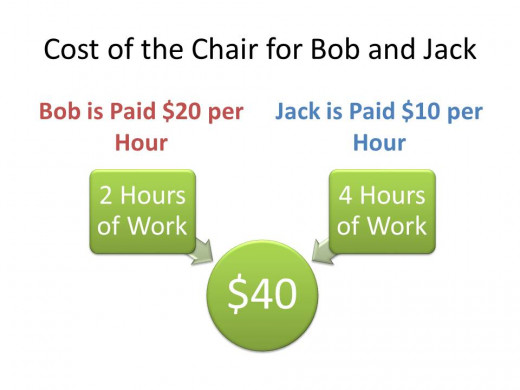
Notice how the chair costs the same amount of money, but Bob only has to work 2 hours to be able to purchase it, while Jack has to work 4 hours. This means that Bob is able to buy 2 chairs for every 1 chair that Jack is able to buy.
In other words, Bob can own twice as much of everything as Jack is able to own. If Jack's house is 1000 sq. ft., Bob's is 2000. If Jack owns one car, Bob owns two.
This is exactly what happens in the world today. Bob is an America or European, Jack can be Mexican, Chinese, Indian, African, etc.
For Christians:
God calls on us to love our neighbor as ourselves. And when asked, "Who is my neighbor?" Jesus shared a parable that made it very clear that everyone is our neighbor.
With this in mind, can we continue to live in luxury at the EXPENSE of others? I am not asking if it is ethical for you to have a lot if others have little - I am asking if it is ethical for you to have a lot because others are working for little.
Would you feel comfortable paying someone $1/day to make your clothing? What would Jesus think of that? What DOES Jesus think of that?
The Wal-Mart Dilemma
In all reality, everyone who speaks out against minimum wage falls into one of two camps:
- Those who are willing to live with fewer possessions and NEVER shop at Wal-Mart, Apple, or other corporations that employee oversees laborers who work for under minimum wage.
- Sick, egocentric individuals who believe that Americans are superior to everyone else.
The only reason corporations are able to succeed when they pay employees so little is because consumers want to pay as little as possible. Americans enjoy the convenience, acceptance and power that come with owning as much stuff as we can.
Did you know that a laptop which costs about $1000 now, would cost closer to $10,000 if it was produced in the United States? That means that the people making your iPad, smartphone, and computer are receiving, at the most, 1/10 of minimum wage here in America. Of course, some companies are starting to produce here in the US, but guess what, they are hiring robots, not people. So bad news - your "Made in America" computer is still not producing any additional American jobs.
This should shock and disgust you. How can we complain about making $7.50 an hour when we know that someone else is making $.75 an hour for the same job (in many parts of the world the pay is closer to $.10-$.20 an hour).
We now have a problem: it is unethical for us to shop at Wal-Mart and support minimum wage because Wal-Mart is selling items made by people for $.10-$.20 an hour. Unless you believe that Americans deserve to own more stuff than people in other parts of the world, minimum wage laws in America are unethical.
It is said that, if slavery had never been outlawed in America, we would not have slaves today. Why? Because the cost of owning, feeding, and providing for a slave would be more expensive than paying someone in China to make everything for you.
Is this ethical?
What Would Happen if Minimum Wage Laws Were Abolished?
The purpose of minimum wage laws are do regulate ethics. Sadly, there are people who will always attempt to take advantage of others without. It's a part of the world we live in. The question is, can government regulations create ethics, or can it only require the unethical to get more creative?
If minimum wage law was removed in the United States, here are the positive things that would happen:
- Manufacturing jobs would return to America: Although the pay would probably be $3-5 an hour, jobs would appear back in America - jobs for people who do not have the capabilities or education for more complex occupations.
- Products would become cheaper: Because McDonald's would be able to pay employees $4 an hour instead of $8, the cost of a Big Mac would be less for everyone.
- Youth and those on welfare could gain work experience: I live in an urban community and people living on welfare are constantly knocking on my door for work. Although they would like to work, no company will hire them because the company is not confident their work value is $7.50/hour. If a company could hire them for $4, to see how well they work, it would be much easier for them to find jobs.
- People would become more entrepreneurial: Some people do not like the idea of working for $2 an hour. These people would then have the opportunity to create businesses of their own - and they would have the opportunity to hire employees.
The negative side of minimum wage would be big corporations charging next to nothing for workers. This would, however, require local people to take action. If McDonald's paid workers $1 an hour, and I believed this to be unethical, then I would not eat at McDonald's. Once enough people did that, McDonald's would increase minimum wage to an acceptable amount.
The problem is that the fear we have of big corporations taking advantage of people is already a reality. It's just that this happens so far away from us that we never take the time to think about what is going on.
Ultimately, minimum wage is not only hurting our own economy by sending jobs to other countries, but it is requiring people in other countries to work in environments worse than we could even imagine. Additionally, when the work conditions are in another country as opposed to here, we don't cry out against it - suggesting that we support the slave labor of companies like Wal-Mart.
The daily GDP per person for the entire world (the average amount everyone produces each day), is about $10 per person. That means that $10 worth of products are created every day. Therefore, this means that every day I live on more than $10, someone else, somewhere in the world, is required to live on less.
If you consume $40 worth of products/food/fuel every day, then 4 other people are having to share $10 a day.
Do you believe that minimum wage is a good idea?
How to Solve the Problem: Remember the Value of Money
Neither Democrat or Republican will be able to solve this problem. It cannot be solved by Occupy Wall-Street. It cannot even be solved by the big corporations themselves. The only solution can come from me and you.
Remember our discussion about money earlier? Money is simply a way to measure time.
If I am paid $10 an hour, then the product will cost $10 more because of my labor. If I am paid $100 an hour, then the product will cost $100 more because of my labor.
In other words, it doesn't matter how much money I get paid in an hour. What matters is the amount that I produce.
None of us like the idea of having to work for everything we get. After all, the American image is one of lavish consumption - living in a huge house, owning multiple cars, and eating extravagant meals. American value is based on the amount that we consume - this is bad news for both non-Americans and Americans.
Think about the chair again. If I want to work 2 hours to buy a chair that takes 4 hours to make, then I am essentially saying that my time is worth double that of the other person.
Of course, some jobs require greater skill, knowledge, and motivation - people who have these abilities have every right to be rewarded for them. It is when I expect to be paid more than someone else doing the exact same job as me that things become unethical.
Minimum wage laws have created an unfair world where poverty runs rampant in developing countries while Americans sit comfortably in our well-heated homes, talk on our smartphones, and live off of government welfare when our jobs get outsourced.
As we are noticing more and more, this is becoming a big problem. Our nation is losing it's prestige and strength in the global marketplace.
Politicians have many different ways of trying to resolve this. Sadly, none of them will work as long as Americans desire to eat, buy, break, and throw away more than they could ever create. This lifestyle is never maintainable. We have no choice but to learn to live on less.
You have now read my thoughts and ideas on this issue. I understand that it is a big problem with no easy solution. Our world has changed a lot in the last 50 years and we must start thinking seriously about how we need to adapt to this new environment.
If you have thoughts, opinions, or ideas on this topic, I invite you to share in the comments below. The purpose of this article is not to provide a solution, but to add to the conversation in the hope of finding a solution.

